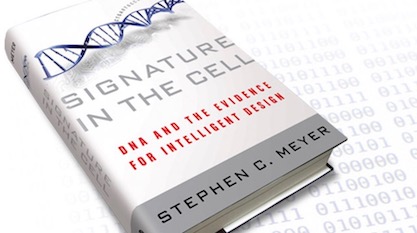 Intelligent Design
Intelligent Design
Nine Years Later, Meyer’s Signature in the Cell Still Stirs Readers’ Praise, Wrath


Some books continue to be read long after the hype of their release has passed. These books contain compelling ideas and stories that speak to our humanity and inspire us to seek out the truth. One of these books is Stephen Meyer’s Signature in the Cell. Published in 2009, Signature has enjoyed tremendous interest in the last nine years, evident not only from sales but from reader reviews, too.
From six major sources of online book reviews (Amazon, Goodreads, Audible, Barnes & Noble, iBooks, and Google Play), Signature has garnered almost 1,900 reader reviews and holds a combined average rating across all those platforms of 4.25, a decidedly positive response from all but the most ideological readers.
A quick look at the breakdown of the ratings shows very few 2- or 3-star ratings. People either love it or hate it! Firmly rooted materialists and Darwinists scoff, calling the book a “waste of tree pulp,” “pseudoscientific,” and “toilet paper.” Positive reviewers praise it for a “thorough analysis” of biological origins and as a “fascinating read” with “convincing” arguments. The number of reviews for Signature in the Cell signals the continued strength of interest in intelligent design. Signature stirs strong emotions in readers, and the book’s ratings over multiple review sites shows that it is not being ignored.
One notable example of the book’s power to inspire fervent responses came soon after its publication. Writing in The Times Literary Supplement of London, noted atheist philosopher Thomas Nagel selected Signature in the Cell as one of his books of the year. Many were surprised by Nagel’s courage and audacity in singling out the book for praise. Nagel noted Meyer’s exploration of the origin of life for its “careful presentation of this fiendishly difficult problem.”
A debate over his choice quickly ensued in the pages of the TLS, a leading international literary and intellectual weekly. While Stephen Fletcher, a professor at Loughborough University, dismissed Signature for what he called its “malicious and absurd thesis,” Nagel defended it as a “challenge to the dogma that everything in the world must be ultimately explainable by chemistry and physics.” The exchange was one of the first of a number of flashpoints generated by the book. Samples of the wider debate were later collected and released as a companion volume, Signature of Controversy. If you missed the TLS debate, it’s still online here.
In his introduction to On the Origin of Species, Charles Darwin wrote that “a fair result can be obtained only by fully stating and balancing the facts and arguments on both sides of each question.” Readers appreciate Meyer’s ability to do this in his books, which is one reason Signature in the Cell’s strong response and positive rating endures nearly a decade after release.
